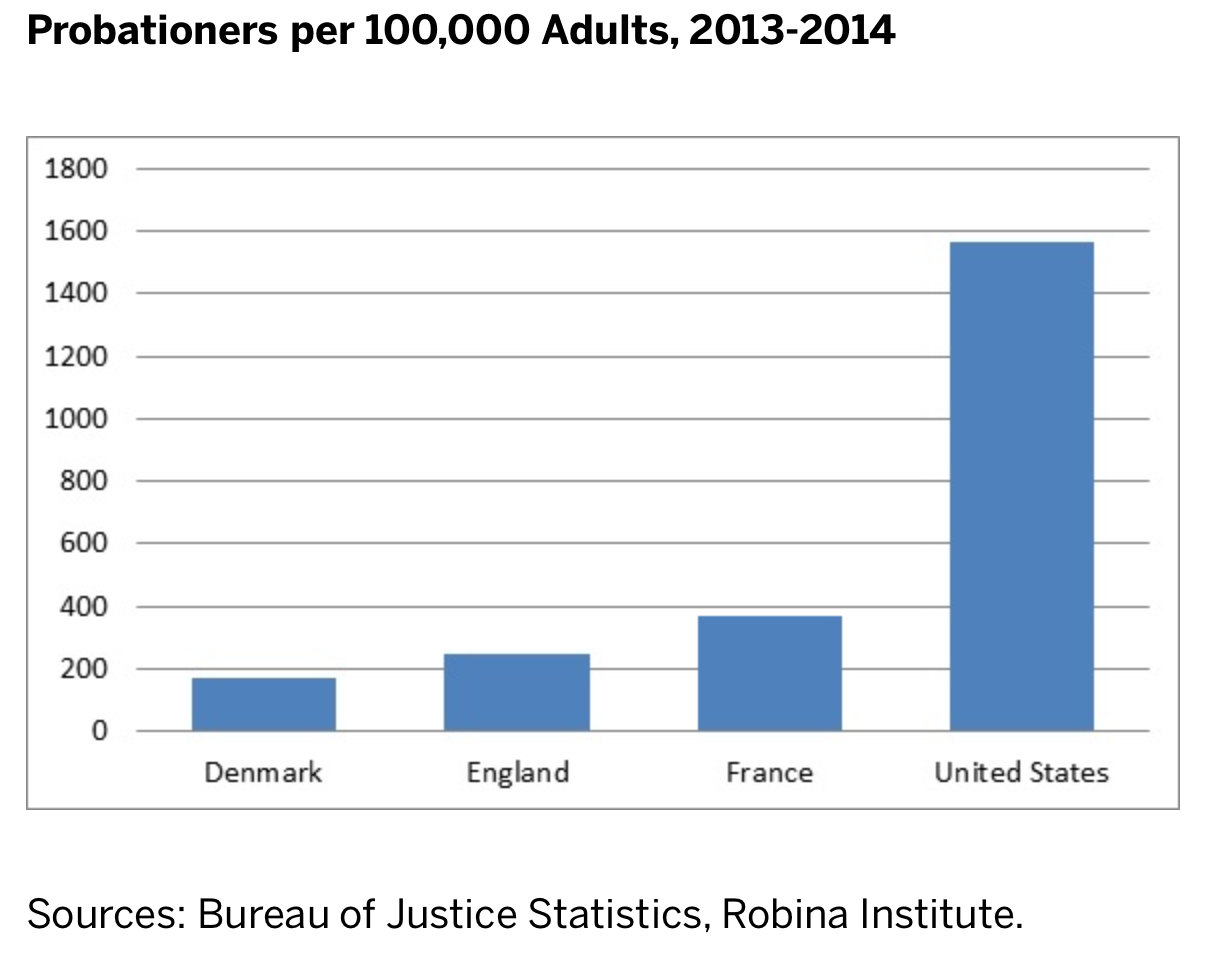I am 99% sure you have no idea what this country is doing to people on probation and parole. Let me tell you why it really matters.

(This is Part Eight in my new weekly series called ABOLITION where I unpack and explain how we deconstruct and abolish America’s criminal, legal, and justice systems – piece by piece.)
Hey Friends,
I’d like to think that you are here because you want to learn something that you don’t already know. Today I’d like to get wonky on what I think may be one of the single most problematic issues with criminal justice that hardly anybody is talking about. Let me unpack and explain it.
The United States is the incarceration nation. Police here arrest more people than any country in the world. Prosecutors convict and imprison more people than any country in the world. Our police regularly kill more people per day than police in many nations kill per year. These realities, rightly so, get a lot of attention, but at the center of all of it is a strange and cruel addiction this country has to probation and parole. Yes, the United States also has more people on probation or parole than any country in the world. With nearly 5 million people currently on probation, it is often the single biggest feeder system for America’s jails and prisons. Not only that, it is regularly used as a primary excuse for violent confrontations with America’s police.
Do you know what probation is? In essence, it’s jail outside of jail. It’s being a prisoner in your own home. Probation is when a person who has been convicted of a crime is offered super-restrictive supervision outside of a conventional jail or prison in place of spending more time behind bars. Maybe you hear that and it sounds like a good thing, but I assure you it is not only a gross tool of oppression that prevents people from ever being able to fully live their life, but it’s also a huge money grab for governments and businesses.
First, let me give you some context. Most developed countries have around 200 people on probation per 100,000 adults. The United States has 800% more than that at nearly 1,600 people on probation per 100,000 adults. But where you really need to understand the crisis of parole in this country is ground zero for it – Georgia – which currently has 6,161 people per 100,000 on probation. That’s a staggering 30 times more than most developed countries. A staggering 1 in 17 Georgians is currently on probation. But even that only tells part of the story – when race if factored into this equation – nearly 1 in 9 African Americans in Georgia is currently on probation.
Again, let me give you context. Right now, Canada, which has a population of 38 million people, has 87,342 people on probation. Georgia, which has a population of about 10.5 million people, has a staggering 206,000 people on probation. In other words, even though Georgia is only 25% the size of Canada, it has 250% more people on probation. Do you understand what I’m saying? Georgia has more people on probation than almost any country in the world. That’s one state!
In Georgia, it’s even more nefarious. They’ve developed privately owned probation companies that are generation tens of millions of dollars for people whose vested interest it is to make sure nobody ever gets off parole. In fact, they’re making people pay outrageous fees for their own drug tests, for their own ankle monitors and the monthly costs of keeping it up, and in some cases the private companies huge up front fees for probation itself. And if you miss a payment, you get sent back to jail. And when you serve your jail time, guess what they normally do when you get out? Put you back on probation. It’s so bad that many men have written me from jail and prison over the years to tell me that they’d rather simply serve out all of their time in prison than be released and put back on an outrageously long probation sentence – sometimes as long as 20 years. They know what I know – it’s a trap. It’s a vicious cycle designed to trap them in perpetual servitude. According to Simone Chérie,
“Nationally, over one-third of all people on probation make less than $10,000 per year — well below the federal poverty line. Another one-third earn less than $20,000 per year. For this income level, probation charges sincerely exacerbate precarious living situations. For felony probationers, the trap is particularly disheartening. Reentering Georgians are mostly low-income earners, and due to their records, they face tall barriers to gainful employment.”
That’s why I call it a trap. Can you imagine making less than $10,000 per year, while most places won’t hire you, and you aren’t even eligible for student aid in some places, only to be threatened with prison if you don’t pay thousands of dollars for your own probationary supervision, drug tests, and ankle monitors? It’s an impossible situation. And it ends up with people who can’t make their payments then going the run, essentially forced to live off the grid, and then making a living in the nation’s informal economy selling whatever they can to get by.
This crisis of probation and parole has to be confronted city by city, county by county, state by state. Right now the federal government doesn’t even offer probation for anybody convicted after 1987 – so pretty much whatever is going to happen on the issue has to happen on the super local level.
Did you learn something new today? If so, I’d love your thoughts in the comments below. Also, please share today’s article when you can and read the rest of the series when you can. I’ve included the links here.
Let me share the rest of my new series, ABOLITION, with you here.
Part 1: We don’t have 1 justice system, but 30,000 microsystems. Let me explain why that REALLY matters.
Part 3: The murder of Breonna Taylor and why the safest cities in America hardly have any police
Part 4: The 53rd time Philando Castile was pulled over: The math of police brutality and American racism
Part 5: Ending the failed “War on Drugs” – which was always more of a war on Black people & communities
Part 6: 9 things that should be decriminalized tomorrow
Part 7: Why we must raise the bar for what “justice” means to us
ABOUT THE AUTHOR: Shaun King is one of the most followed and shared activists and journalists in the world. In addition to being the Founder and Editor in Chief of The North Star, he also leads the Grassroots Law Project and the Real Justice PAC. A historian by training, Shaun King is the New York Times bestselling author of Make Change: How to Fight Injustice, Dismantle Systemic Oppression, and Own Our Future. Shaun’s daily news podcast, The Breakdown with Shaun King, has been heard and shared hundreds of millions of times in almost every country in the world and is available on Apple Podcasts, Spotify, and everywhere podcasts are heard. Shaun has been with his brilliant wife, Rai, for nearly 25 years, and they are raising their 5 kids in Brooklyn, New York.


